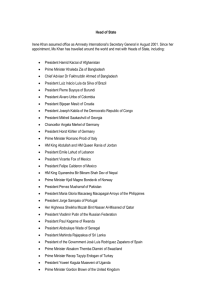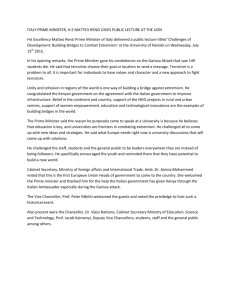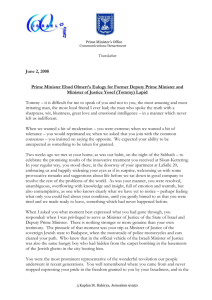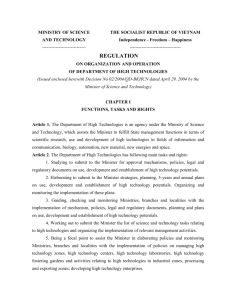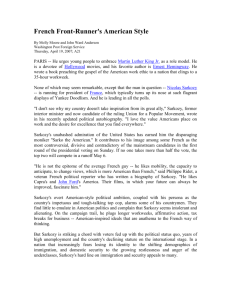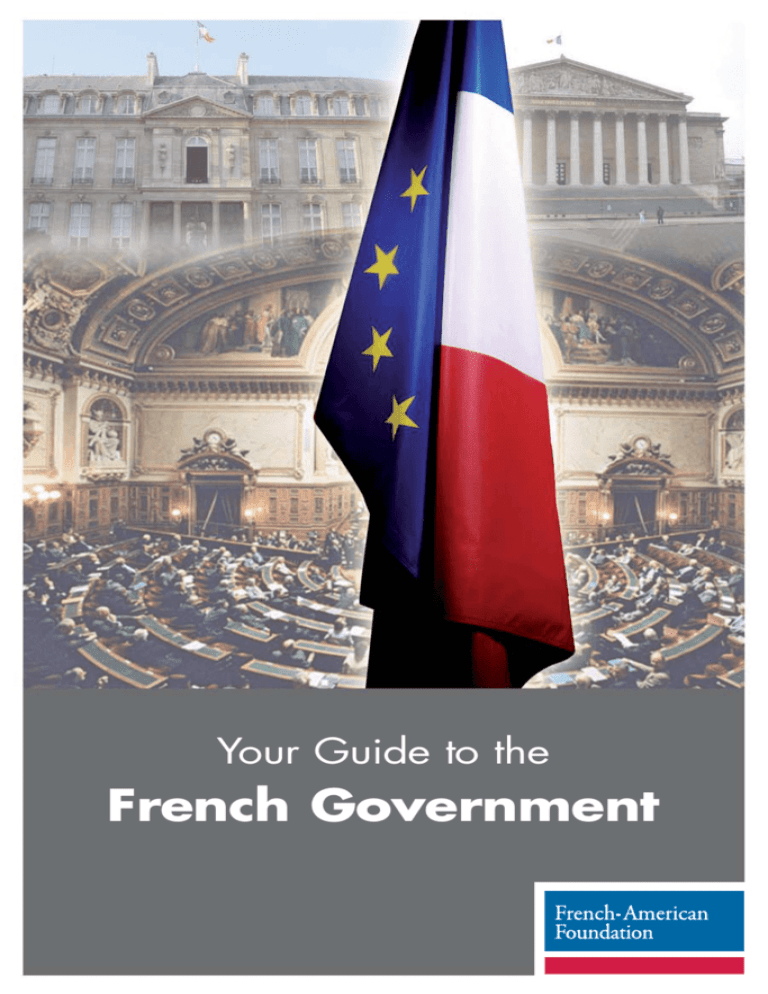
Your Guide to the
French Government
Statement of Purpose
The French-American Foundation is the principal non-governmental
link between France and the United States at leadership levels
and across the full range of the French-American relationship.
The purpose of the French-American Foundation is to strengthen
the French-American relationship as a vital component of the
trans-Atlantic partnership.
Founded in 1976, the French-American Foundation is also
committed to ensuring that the French-American relationship
should be vivid and relevant for the new generations that have
come of age since the end of the Cold War.
MAYA press
www.mayapress.net - t: 212-260-5869
Cover photos: Alain Mengus. All rights reserved.
Your Guide to the
French Government
INTRODUCTION
France, a founding member of the European Union, has a
population of 62.8 million (including overseas territories) and
is the sixth largest economy in the world.
In spring 2007, a year before the highly anticipated American
presidential elections, France held its presidential and legislative
elections. Elected in May 2007, President Nicolas Sarkozy
represents a generational shift in France’s leadership.
What follows is your guide to the French government and a
brief overview of the French political system.
French-American Foundation
1
© Philippe Warrin – La Documentation Française
French President Nicolas Sarkozy
2
Your Guide to the French Government
EXECUTIVE BRANCH
France is a republic of which the
executive branch is led both by a
President and a Prime Minister. Current
President Nicolas Sarkozy and Prime
Minister François Fillon belong to the
Union for a Popular Movement (UMP),
the center-right political party. Unlike the
U.S. President who is elected indirectly
by the Electoral College, the French
President is elected directly by universal
suffrage for a five-year term and serves
as the Head of State. The Prime Minister
is appointed by the President and leads
the Government.
DIVISION OF POWERS
The President names the Prime
Minister, presides over the Cabinet,
serves as commander-in-chief of the
armed forces and concludes treaties.
He may also dissolve the National
Assembly, the more prominent of the two
chambers of Parliament. Most of the
President’s powers are subject to
countersignature by the Prime Minister.
In the event of a national emergency,
the President may assume comprehensive
powers. Under normal circumstances,
however, the President may not introduce
legislation or regulations but instead may
only make recommendations to both
Parliament and the Prime Minister.
The Prime Minister directs and
supervises the operations of the
Government. The Prime Minister is also
responsible for the implementation of
laws and, unlike the President, has the
authority to introduce bills in Parliament.
FRENCH PRESIDENT NICOLAS SARKOZY
Nicolas Sarkozy, 52, officially took
office as President of the Republic on
May 16, 2007, following his election
on May 6 with 53.06% of the votes.
The son of a Hungarian immigrant,
Sarkozy is an attorney by education and
went into politics at the age of 22.
Throughout his political career, he has
held many positions, including city
councilor, mayor, Deputy in the National
Assembly, Minister of the Budget,
Finance Minister, and lastly, Minister of
the Interior under President Chirac.
Elected on the promise of change and
strong leadership, he is recognized on
both the right and the left as a skilled
politician and a commanding orator.
Sarkozy is considered more pro-U.S.
than most French politicians. Some view
him as departing from traditional French
social and economic policies in favor
of American-style economic reform.
Nicolas Sarkozy is married and has
three children.
French-American Foundation
3
PRESIDENT SARKOZY’S AGENDA
International agenda:
• Take the lead on climate change
issues.
• Revitalize the European Union, which
has gained momentum towards reform
at the EU Summit of June 2007.
Strengthen ties with European partners,
especially Germany. Create a unified
European defense identity.
• Invigorate the France-U.S. relationship.
• Promote a Mediterranean union as a
link between Europe and Africa. Work
with Africa to design a policy of
controlled immigration and ambitious
economic development.
• Be at the forefront of the defense of
human rights at the international level.
Lefeuvre © Service Photographique de la Présidence de la République
Domestic Priorities
• Loosen constraints on employment
laws, notably the 35 hour-work week.
(France’s current unemployment rate is
approximately 8%.) Encourage overtime
and higher earnings. Ease hiring and
lay-off restrictions. Reduce the duration
of unemployment benefits.
• Implement tax cuts and incentives to
encourage wealth creation and attract
investors.
• Reduce the number of civil servants.
• Adopt a rigorous immigration policy
by toughening measures on illegal
immigration.
• Promote educational success and
social mobility for immigrant and
minority populations.
G8 Summit in Heiligendamm, Germany, June 2007
4
Your Guide to the French Government
© David Mendiboure – Matignon
The New Cabinet
PRIME MINISTER FRANÇOIS FILLON AND THE CABINET
The Cabinet
The third component of the executive
branch is the Cabinet. The Cabinet is
a Council of Ministers appointed by the
President based on recommendations
by the Prime Minister. Ministers (ministres)
are the most senior members of the
Government; Secretaries of State
( secrétaires d'Etat ) assist ministers in
particular areas of their portfolio. The
number of ministries as well as the nature
of their responsibilities can vary.
Prime Minister François Fillon, 53,
is a former Minister for National Education,
Higher Education and Research (20042005), as well as a former Minister of Social
Affairs, Employment, and Solidarity (20022004). He has also held positions as Senator
and Deputy in the National Assembly, and
was the director of Mr. Sarkozy’s successful
presidential campaign.
A moderate, Mr. Fillon is said to believe
in social inclusiveness and has gained a
reputation as consensual reformer.
French-American Foundation
5
COMPOSITION OF THE CABINET
© David Mendiboure – Matignon
Appointed on June 19, 2007, Prime
Minister Fillon’s cabinet comprises
15 ministers, 16 Secretaries of State and
one High Commissioner.
Affirming the presidential priority given to
climate issues, the Ministry of Environment
is the highest-ranking ministry in the current
government.
The cabinet demonstrates President Sarkozy’s
determination to bring about gender parity
Prime Minister François Fillon
amongst its members. Women represent
half of the ministers, three of whom are in
charge of high-profile ministries.
The new cabinet reaches across party lines.
Several socialists as well as members of the
center party were appointed to government
posts. Bernard Kouchner, a prominent figure
in the Socialist party, is now Minister of
Foreign and European Affairs, while Hervé
Morin, a key spokesperson of the centrist
UDF (Union for French Democracy) party,
is Minister of Defense.
This government also reflects a strong stance
on promoting diversity. Judge Rachida Dati,
Minister of Justice, is the first person of North
African descent to hold such a high-ranking
office. Other minority figures hold important
positions in the cabinet.
CURRENT MINISTRIES AND THEIR MINISTERS ARE:
Ministry of Environment, Sustainable Development, and Public Works
Jean-Louis Borloo
Number two in Prime Minister Fillon’s cabinet, Jean-Louis Borloo is a former
lawyer and former Minister of Employment.
This unprecedented super ministry of Environment was created to reconcile
the imperatives of sustainable development and economic growth, to implement
energy policy and to ensure the steady provision of energy resources in the
context of the fight against global warming.
Ministry of the Interior and Overseas Departments
Michèle Alliot-Marie
Former Minister of Defense (2002-2007), Michèle-Alliot Marie is the most
experienced of President Sarkozy’s staff members. A former lawyer, she holds a
Ph.D. in law. She has held many positions throughout her political career, amongst
them: Deputy in the National Assembly and in the European Parliament.
Ministry of Foreign and European Affairs
Bernard Kouchner
An outspoken figure from the left, Bernard Kouchner, M.D., was health minister and
minister of humanitarian affairs in the cabinets of the late President François Mitterrand,
prior to becoming United Nations governor of Kosovo (1999-2001). Co-founder
of the Nobel prize-winning medical aid agency Doctors Without Borders (Médecins
sans Frontières), Bernard Kouchner has always been a proponent of intervention in
humanitarian crises. In 2003, he took position in favor of the Iraq war.
A popular political figure, Bernard Kouchner intends to give high priority to
the defense of human rights as Minister of Foreign Affairs.
6
Your Guide to the French Government
Ministry of Economy, Finance and Employment
Christine Lagarde
Christine Lagarde was formerly the Minister of Trade (2005-2007), and as such,
participated in key world trade negotiations. Prior to that, she was a senior corporate
lawyer at US law firm of Baker and McKenzie in Chicago. A graduate of the Institute
of Political Science of Paris, Christine Lagarde is France’s first female Minister of Finance.
Beyond its traditional prerogatives in economic policy, this ministry encompasses
the fields of industry and foreign trade. Christine Lagarde will represent France at
the World Trade Organization and other international conferences. On the domestic
front, she is to supervise Mr. Sarkozy’s economic reforms, including tax cuts and
measures to liberalize the job market
Ministry of Immigration, Integration, National Identity, and Co-Development
Brice Hortefeux
Brice Hortefeux was formerly Deputy Minister of Interior (2005-2007), and
Deputy in the European Parliament. He graduated from the Institute of Political
Science of Paris, and holds a degree in law.
This newly created ministry establishes a coherent design for and implementation
of immigration policy, formerly the split purview of four different ministries.
It emphasizes the notion of integration, and aims to promote French Republican
values and language as crucial vehicles to assimilation and French citizenship.
Espousing a pragmatic approach, this ministry is also responsible for the
conception of an ambitious policy of cooperation with African countries, in order
to have an upstream effect on immigration.
Ministry of Justice
Rachida Dati
As former advisor to then Minister of Interior Nicolas Sarkozy, Rachida Dati
specialized in youth delinquency and immigration issues. She holds Master’s
degrees in law and economics, and graduated from the prestigious National
College of Magistrates in 1997.
Rachida Dati’s nomination is seen as a symbol of President Sarkozy’s commitment
to promote minorities and revitalize the French political landscape.
Ministry of Defense
Hervé Morin
A graduate of the Institute of Political Science of Paris, Hervé Morin made
the transition from civil servant to politician in 1989. He has held several
political positions: mayor, Deputy in the National Assembly and special advisor
to the Minister of Defense. In the outgoing National Assembly, Hervé Morin
sat on the Defense Commission, and was spokesperson of the UDF (Union
for French Democracy) center party group.
OTHER MINISTRIES AND MINISTERS
Ministry
Ministry
Ministry
Ministry
Ministry
Ministry
Ministry
Ministry
of
of
of
of
of
of
of
of
Agriculture and Fisheries – Michel Barnier
Labor, Society, and Solidarity – Xavier Bertrand
National Education – Xavier Darcos
Higher Education and Research – Valérie Pécresse
Health, Youth and Sports– Roselyne Bachelot-Narquin
Housing and Urban Affairs – Christine Boutin
Culture and Communications – Christine Albanel
Budget, Public Accounts and Civil Service – Eric Woerth
French-American Foundation
7
LEGISLATIVE BRANCH
France’s Parliament consists of two chambers, the Senate and the National Assembly.
Elected members pass statutes, vote on the budget and monitor the actions of the
executive branch.
NATIONAL ASSEMBLY
There are 577 deputies in the National
Assembly. Like the Senate, the National
Assembly is empowered to submit and
amend bills and to vote on the budget.
However, while both chambers must
pass a bill for it to become a law, in
the event of a disagreement between
the two chambers, the Government can
decide to give the National Assembly
the last word in the legislative process.
Unlike the Senate, the National
Assembly has the power to cause a
government to fall if a majority of the
8
Your Guide to the French Government
total Assembly membership votes to
censure it. In this case, the President
forms a new Governement. However,
this prodedure remains exceptional and
has only happened once since the
founding of the Fifth Republic by
President de Gaulle in 1958.
Deputies in the National Assembly are
elected to five-year terms by direct
universal suffrage in a two-round
system of elections. Every five years,
the full National Assembly is up for
re-election.
THE NEWLY ELECTED NATIONAL ASSEMBLY (JUNE 2007)
In the new National Assembly, the
President’s party, the UMP, holds the
majority of seats with 313 deputies out
of 577. Its main rival party, the Socialist
party and its allies, holds 208 seats.
The other political parties at the
National Assembly are: the UMP
center-right allies (32 deputies); the
independent pro-European center
MoDem (3); the Communist party (15);
the Green party (4). Two deputies are
independent.
The current National Assembly should
be in place until the end of President
Sarkozy’s first term of office in 2012.
As the UMP holds the majority, the
French President should be ensured a
reasonable degree of political stability.
SENATE
The Senate's legislative powers are similar
to those of the National Assembly. The
Senate submits and amends bills as well
as votes on the budget. However, the
National Assembly can overrule the Senate
in the legislative process in the case of a
disagreement. Unlike the National
Assembly, the Senate cannot be dissolved.
Members of the Senate are elected
indirectly by electoral colleges in their
districts and serve six-year terms. Every
three years, half of the Senate is up for
re-election. There are 331 seats in the
Senate, including twelve senators
representing French nationals living
abroad. The next Senate elections will
be held in September 2008. Fifteen
new seats will gradually be added to
the Senate over the next two elections
in 2008 and 2011.
French-American Foundation
9
>
HIGHLIGHTS FROM NICOLAS SARKOZY’S VICTORY SPEECH
May 6, 2007 (as reported by the BBC)
My dear compatriots, as I speak to you
this evening, at this time which, as everyone
understands, is exceptional in a man's life,
I feel enormous, sincere, deep emotion.
From a very young age I have felt
incredible pride at belonging to a great,
an old, a beautiful nation, that of France.
I love France as you love someone dear,
someone that has given me everything.
Now it is my turn to give back to France
what France has given me.
National pride
The French people have spoken and
have chosen to make a break with the
ideas, the customs and the behaviour
of the past. I am thus going to restore
the status of work, authority, standards,
respect, merit. I am going to give the
place of honour back to the nation and
national identity. I am going to give back
to the French people pride in France.
10
Your Guide to the French Government
Getting France moving
The French people have opted for
change. I shall be implementing this
change because this is the mandate I
have received from the people and
because France needs it - but I shall
do this with all of the French people. I
shall do it in a spirit of unity and in a
spirit of fraternity. I shall do it in such
a way that no one is left with the
feeling of being excluded, of being left
to one side.
'Back in Europe'
I want to issue an appeal to our
European partners, to whom our
destiny is profoundly linked, to tell them
that my whole life I have been a
European, that I believe deeply, that I
believe sincerely in European
construction, and that tonight France
is back in Europe.
America and climate change
I want to issue an appeal to our
American friends, to tell them that they
can count on our friendship, which has
been forged in the tragedies of history
which we have faced together.
I want to tell them that France will always be
by their side when they need it, but I also
want to tell them that friendship means
accepting that your friends may think
differently and that a great nation such as
the United States has a duty not to put
obstacles in the way of the fight against
global warming, but on the contrary to take
the lead in this fight, because what is at
stake is the fate of humanity as a whole.
France will make this battle its primary battle.
The Mediterranean and Africa
What was done for the union of Europe
60 years ago, we are going to do today
for the union of the Mediterranean.
I want to issue a call to all Africans, a
brotherly call, to tell Africa that we want
to help it, to help Africa to vanquish
illness, to vanquish famine, to vanquish
poverty, to live in peace. I want to tell
them that we are going to work together
on decisions concerning a policy of
controlled immigration and a policy of
ambitious development.
Tolerance and tyranny
I want to issue a call to everyone in the
world who believes in the values of
tolerance, freedom, democracy,
humanism, to all those who are
persecuted by tyranny, by dictatorships.
I want to tell all of the children throughout
the world, all of the ill-treated women
throughout the world - I want to tell them
that it will be France's pride and its duty
to be at their side.
France will not abandon the women who
do not have freedom. France will be on
the side of the oppressed of the world.
This is France's message, it is France's
identity, it is France's history.
(www. news.bbc.co.uk)
French-American Foundation
11
FRANCE’S INTERNATIONAL AGENDA
On July 1, 2008, France will take the Presidency
of the Council of the European Union.
The EU Council Presidency is held by each Member State on
a rotating basis for a period of six months. During this time,
the Presidency represents the European Union, speaking on behalf
of all Member States at major international conferences.
INSTITUTIONAL/OFFICIAL FRENCH AND EU SITES*
*all sites listed below are available in English
France
French Presidency
www.elysee.fr
Prime Minister
www.premier-ministre.gouv.fr
Minister of Foreign Affairs
www.diplomatie.gouv.fr
National Assembly
www.assemblee-nationale.fr
Senate
www.senat.fr
Embassy of France in the United States
www.ambafrance-us.org
European Union
European Commission
www.europa.eu
European Parliament
www.europarl.europa.eu
European Central Bank
www.ecb.int/bc
EU Council Presidency
www.eu2007.org
FURTHER INFORMATION
For further information or to inquire about membership of the French-American
Foundation, you may:
• contact us at:
info@frenchamerican.org
12
Your Guide to the French Government
• or visit our website at:
www.frenchamerican.org.
BOARD OF DIRECTORS
Honorary Chairman
Chairman
Vice-Chairmen
President
Walter J.P. Curley
Michael E. Patterson
François Bujon de l’Estang
Mrs. Anastassios Fondaras
Nicholas W. F-R. Dungan
Pierre Albouy
Elizabeth Frawley Bagley
Anne Cox Chambers
Allan M. Chapin
Paul B. Clemenceau
Alain Coblence
Bertrand Collomb
Michel David-Weill
Shannon Fairbanks
Charles Ferguson
Michel Garcin
Adam Gopnik
Robert L. Gordon, III
Charles B. Grace, Jr.
John H.J. Guth
Catharine Hamilton
Arthur A. Hartman
John G. Heimann
Stanley Hoffmann
Janet Howard
Yves-André Istel
FOUNDING
DIRECTORS
James Chace
James G. Lowenstein
Nicholas Wahl
Tony R. Judt
Jean Karoubi
Richard L. Kauffman
Howard H. Leach
Troland S. Link
James G. Lowenstein
Joanne Lyman
David T. McGovern
Clare Tweedy McMorris
William B. Matteson
Douglas M. Price
Felipe Propper de Callejon
Felix G. Rohatyn
Alfred J. Ross
Ernest A. Seillière
Leonard L. Silverstein
Anthony A. Smith
Marie-Monique Steckel
Elizabeth Stribling
John A. Thain
G. Richard Thoman
PAST CHAIRMEN
PAST PRESIDENTS
C. Douglas Dillon
John N. Irwin, II
Walter J.P. Curley
John D. Negroponte
Arthur King Peters
Sarah V. Pais
Edward H. Tuck
Michael Iovenko
Anthony A. Smith
Tel: (212) 829-8800
info@frenchamerican.org
www.frenchamerican.org
French-American Foundation
28 West 44th Street, Suite 1420
New York, NY 10036




